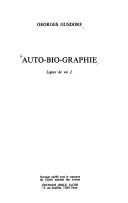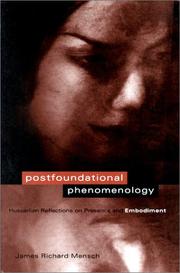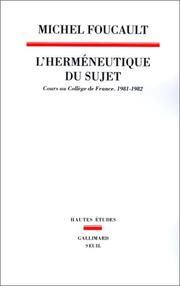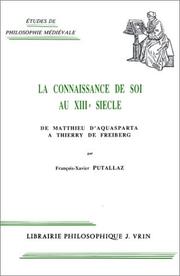| Listing 1 - 10 of 12 | << page >> |
Sort by
|
Book
ISBN: 2213014159 9782213014159 Year: 1984 Publisher: Paris : Fayard,
Abstract | Keywords | Export | Availability | Bookmark
 Loading...
Loading...Choose an application
- Reference Manager
- EndNote
- RefWorks (Direct export to RefWorks)
Self (Philosophy) --- Moi (Philosophie) --- History --- Histoire --- -#GROL:SEMI-165 --- #GROL:SEMI-165 --- Self (Philosophy) - History
Book
ISBN: 9781315190785 1315190788 9781351750127 1351750127 9781351750141 1351750143 9781351750134 1351750135 1138727660 9781138727663 9781138727649 Year: 2021 Publisher: London Routledge, Taylor & Francis Group
Abstract | Keywords | Export | Availability | Bookmark
 Loading...
Loading...Choose an application
- Reference Manager
- EndNote
- RefWorks (Direct export to RefWorks)
"This title was first published in 2001. Explaining and defending a Heideggarian account of the self and our knowledge of the world, this book addresses the fundamental issues of selfhood and the elemental question of what it means to be human. Mitchell critically examines theories of the self derived from two distinct schools of thought: Descartes, Hume, Kant, Sartre and Stirner representing a tradition which has dominated Western philosophy since Descartes; Heidegger and Laing representing a radical departure from the tradition. Mitchell focuses on two key philosophical problems throughout: the problem of knowledge and the problem of identity. Mitchell argues that ultimately Heidegger does no more than echo Stirner's empty egoism and provides a bleak, inescapable heroism for the individual."--Provided by publisher
Self (Philosophy) --- Political Philosophy --- Continental philosophy --- History --- Heidegger, Martin, --- Heidegger, Martin --- Philosophical anthropology --- Self (Philosophy) - History --- Heidegger, Martin, - 1889-1976
Book
ISBN: 0262200562 0262285207 0585337136 9780585337135 9780262200561 0262700387 9780262700382 Year: 1986 Publisher: Cambridge, Mass.
Abstract | Keywords | Export | Availability | Bookmark
 Loading...
Loading...Choose an application
- Reference Manager
- EndNote
- RefWorks (Direct export to RefWorks)
Philosophical anthropology --- Self (Philosophy) --- Self-consciousness (Awareness) --- History --- -Self-consciousness --- -History --- Self-awareness --- Self-consciousness --- Consciousness --- Self (Philosophy) - History --- Self-consciousness (Awareness) - History
Book
ISBN: 2717840435 9782717840438 Year: 2000 Volume: *7 Publisher: Paris : Anthropos : Diffusion Economica,
Abstract | Keywords | Export | Availability | Bookmark
 Loading...
Loading...Choose an application
- Reference Manager
- EndNote
- RefWorks (Direct export to RefWorks)
Autobiography --- Autobiographie --- Sociological aspects --- Aspect sociologique --- Self-presentation --- Identity (Psychology) --- Self (Philosophy) --- History --- Sociology --- Biographical methods --- Psychology --- Ethnology --- Self (Philosophy) - History

ISBN: 2738100570 9782738100573 Year: 1991 Volume: 1 Publisher: Paris Jacob
Abstract | Keywords | Export | Availability | Bookmark
 Loading...
Loading...Choose an application
- Reference Manager
- EndNote
- RefWorks (Direct export to RefWorks)
Philosophical anthropology --- Comparative literature --- Non-fiction --- Self (Philosophy) --- Autobiography. --- History. --- Autobiography --- -#GGSB: Filosofie --- Autobiographies --- Egodocuments --- Memoirs --- Biography as a literary form --- History --- History and criticism --- Technique --- #GGSB: Filosofie --- Filosofie --- Self (Philosophy) - History.
Book
ISSN: 02497980 ISBN: 9782711619276 9782711619740 9782711625338 2711619273 2711619745 2711625338 Year: 2002 Publisher: Paris Vrin
Abstract | Keywords | Export | Availability | Bookmark
 Loading...
Loading...Choose an application
- Reference Manager
- EndNote
- RefWorks (Direct export to RefWorks)
Qu’appelle-t-on penser? La pensée est-elle un acte? Une action? Pensée et conscience vont-elles de pair? Toute pensée est-elle consciente? Personnelle? Subjective? Immanente? Le sujet de la pensée est-il psychique ou corporel? Unique ou multiple? Âme ou esprit? Esprit ou corps? Avec ce troisième tome commence, scandé par les interventions successives de l’Université (condamnations parisiennes de 1277) et du Magistère (concile de Vienne, 1312, et de Latran V, 1513), la relation d’un débat de plus de cinq siècles sur l’aptitude de l’homme à revendiquer le statut de sujet-agent psychique. Tout gravitant autour d’Aristote et de Descartes, on monte vers ce dernier en historiens du Moyen Âge et descend vers lui en archéologues de la modernité – d’où l’image de l’escalier à double vis. La description heideggérienne du « moment » cartésien de l’invention de la subjectivité ne suffisant pas à décrire le passage à la modernité, dans la mesure où elle ne livre que l’histoire allemande, idéaliste, transcendantale, bref « kantienne » de l’invention du sujet, on s’attache à l’autre source de la modernité en psychologie et philosophie de l’esprit : empiriste, autrichienne (Brentano), mais aussi anglaise (Locke) et écossaise (Reid, Hamilton). L’Acte de penser comporte donc deux volumes. La Double révolution va d’Aristote à Reid, avec Averroès, Siger de Brabant, Thomas d’Aquin et Olivi. L’Empire du sujet revient au Moyen Âge à partir de la modernité.
Subject (Philosophy) --- Sujet (Philosophie) --- Philosophical anthropology --- History of philosophy --- Thought and thinking --- Consciousness --- Philosophy --- Identity (Philosophical concept) --- Identité --- Pensée --- History --- Histoire --- Consciousness - Philosophy --- Self (Philosophy) --- Self (Philosophy) - History --- Soul - History of doctrines --- Ontology --- Soul --- Sujet (philosophie)

ISBN: 0271020474 9780271020471 Year: 2001 Publisher: University Park, Pa Pennsylvania State University Press
Abstract | Keywords | Export | Availability | Bookmark
 Loading...
Loading...Choose an application
- Reference Manager
- EndNote
- RefWorks (Direct export to RefWorks)
Theory of knowledge --- Husserl, Edmund --- Body, Human (Philosophy) --- Self (Philosophy) --- History --- -Self (Philosophy) --- -Philosophy --- Philosophy --- -History --- -Husserl, Edmund --- -Contributions in philosophy of experience --- -Body, Human (Philosophy) --- Husserl, Edmond --- Contributions in philosophy of experience --- Human body (Philosophy) --- Husserl, Edmund, --- Body, Human (Philosophy) - History - 20th century. --- Self (Philosophy) - History - 20th century.

ISBN: 9782020308007 2020308002 Year: 2001 Publisher: Paris Seuil
Abstract | Keywords | Export | Availability | Bookmark
 Loading...
Loading...Choose an application
- Reference Manager
- EndNote
- RefWorks (Direct export to RefWorks)
Dans le cours qu'il consacre en 1982 à L'Herméneutique du sujet, Michel Foucault présente une enquête sur la notion de " Souci de soi ", qui, bien plus que le fameux " Connais-toi toi-même ". organise les pratiques de la philosophie. Il s'agit de montrer selon quelles techniques, quelles procédures et quelles finalités historiques un sujet éthique se constitue, dans un rapport à soi déterminé. Ces études débordent le cadre de la stricte histoire de la philosophie. En décrivant le mode de subjectivation antique, Michel Foucault cherche à rendre éclatante la précarité du mode de subjectivation moderne. En relisant les Anciens, il nous permet de nous interroger sur notre identité de sujet moderne. Tout son travail consiste à nous rendre davantage étrangers à nous-mêmes, en montrant l'historicité de ce qui pouvait sembler le plus anhistorique : la manière dont, comme sujets, nous nous rapportons à nous-mêmes. Ce qu'aura permis encore ce passage aux Anciens, c'est une reformulation du problème politique : et si les luttes aujourd'hui n'étaient plus seulement des luttes contre les dominations politiques, plus seulement des luttes contre les exploitations économiques, mais des luttes contre des assujettissements identitaires ? Michel Foucault, relisant Platon et Marc Aurèle, Epicure et Sénèque, cherche, non pas de quoi dépasser, mais de quoi repenser la politique.
Philosophy, Ancient. --- Self (Philosophy) --- History. --- Philosophy, Ancient --- -Ancient philosophy --- Greek philosophy --- Philosophy, Greek --- Philosophy, Roman --- Roman philosophy --- History --- Hermeneutics --- Herméneutique --- Moi (Philosophie) --- Ancient philosophy --- Philosophical anthropology --- Political philosophy. Social philosophy --- General ethics --- Herméneutique --- Hermeneutics. --- Subject (Philosophy) --- Foucault, Michel 1926-1984 --- Contributions in hermeneutics. --- Self (Philosophy) - History --- Philosophie politique --- Sujet (philosophie) --- Philosophie politique.
Multi
ISBN: 3525305036 9783525305034 Year: 1992 Volume: 3 Publisher: Göttingen : Vandenhoeck & Ruprecht,
Abstract | Keywords | Export | Availability | Bookmark
 Loading...
Loading...Choose an application
- Reference Manager
- EndNote
- RefWorks (Direct export to RefWorks)
Self (Philosophy) --- Soul --- Psychology --- Moi (Philosophie) --- Ame --- Psychologie --- History --- History of doctrines --- Philosophy --- Histoire --- Histoire des doctrines --- Philosophie --- Plato --- -Soul --- -Pneuma --- Future life --- Philosophical anthropology --- Theological anthropology --- Animism --- Spirit --- Aflāṭūn --- Aplaton --- Bolatu --- Platon, --- Platonas --- Platone --- Po-la-tʻu --- Pʻŭllatʻo --- Pʻŭllatʻon --- Pʻuratʻon --- Πλάτων --- אפלטון --- פלאטא --- פלאטאן --- פלאטו --- أفلاطون --- 柏拉圖 --- 플라톤 --- Theses --- -History --- Plato. --- Platon --- Platoon --- Платон --- プラトン --- Soul - History of doctrines --- Self (Philosophy) - History

ISBN: 2711610748 9782711610747 Year: 1991 Volume: 67 Publisher: Paris : Librairie J. Vrin,
Abstract | Keywords | Export | Availability | Bookmark
 Loading...
Loading...Choose an application
- Reference Manager
- EndNote
- RefWorks (Direct export to RefWorks)
Self (Philosophy) --- Self-knowledge, Theory of --- Philosophy, Medieval. --- Moi (Philosophie) --- Connaissance de soi --- Philosophie médiévale --- History. --- History --- Histoire --- -Self-knowledge, Theory of --- -Philosophy, Medieval --- Medieval philosophy --- Scholasticism --- Introspection (Theory of knowledge) --- Knowledge, Reflexive --- Knowledge of self, Theory of --- Reflection (Theory of knowledge) --- Reflexive knowledge --- Knowledge, Theory of --- Personality (Theory of knowledge) --- Philosophie médiévale --- Philosophy, Medieval --- Self (Philosophy) - History. --- Self-knowledge, Theory of - History. --- Matthaeus de Aquasparta, --- Theodoricus Teutonicus,
| Listing 1 - 10 of 12 | << page >> |
Sort by
|

 Search
Search Feedback
Feedback About UniCat
About UniCat  Help
Help News
News